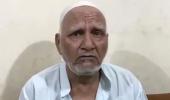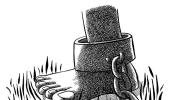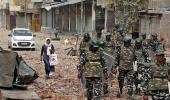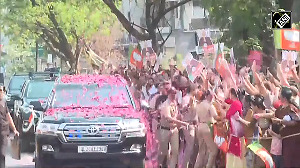'There are many people languishing in jail under these draconian laws, where it takes them 10 years, 15 years, to finally be acquitted.'
'Who is going to account for those years?'
'The home ministry's statistics says that between 2016 and 2019, the conviction rate (under UAPA) is only 2 per cent and the use of UAPA has increased by more than 70 per cent.'
'The government statistics itself is so revealing what the purpose of this law (UAPA) is.'

The three student activists were charged by the Delhi police under the draconian Unlawful Activities (Prevention) Act. Photograph: Pinjra Tod/Facebook
Devangana Kalita, the Pinjra Tod activist, and her fellow activist Natasha Narwal were granted bail by the Delhi high court in the UAPA case slapped against them by the Delhi police in the north-east Delhi riots 'conspiracy' case, June 16, 2021.
In the first of a two-part interview with Prasanna D Zore/Rediff.com, Devangana describes her 13 month stay inside Tihar jail, what freedom means to her, why she considers the Delhi high court judgment as a silver lining and the thoughts that crossed her mind on the first and last day of her incarceration.
How would you describe your 13-month prison term in one word?
Wow. In one word? I guess, intense.
And, if you were to pour your heart out while describing 'intense'?
Well, it was both traumatising and strength-giving experience because prison is not easy for anybody. It's a very dehumanising, brutalising space.
Yet you learn how to survive there, which also happens collectively, and since Natasha and Gulfisha (Fatima, also charged under UAPA in the Delhi riots case) were together (it helped me come to terms with the 13-month prison term).
All the support that you received outside, as well as the relationships of love and care that one forms with other inmates inside, all of that combined, I think was very important in the last 13 months (to help me come to terms with life inside a prison).
Open skies for you, finally. How temporary would they be and what do they mean to you now?
Open skies were something, which I was always fascinated by. And it would be difficult to imagine to not be able to see them was one of the most striking things for me...
For 13 months you did not see the skies?
Let's say, you would not see open night skies. There was a park outside our ward where you would be able to sit outside during the day. But at night you get locked up at 6.30. So, we would all wait in front of our barrack window to witness the open skies and the moon when it passed through the window for a few hours.
It's been also really crazy last few days. So one actually hasn't had as much time as I would want to, but it's still like a mixed feeling because three of us would look at that night sky and the moon from the barrack.
Even now, when you look at the moon, you almost sometimes feel those rods (of the prison window) flashing in front of the eyes, and then one sees the face of one very dear friend (Gulfisha), whom we have left behind, and whose view the window rods are still obstructing.
It's like you have left a part of you behind, so you are both inside and outside (prison). It's very complicated, incomplete feeling; the joy of witnessing the open skies and the moon is incomplete without Gulfisha by your side.
How long do you think, given how the Narendra Damodardas Modi government has dealt with anti-CAA protests, would you be enjoying the open skies?
I know these open skies may not be infinite, forever. The legal battle is still continuing.
Since the matter is sub judice, I can't say much about it, but we are very thankful to the Delhi high court for this fantastic order in terms of how it laid out so clearly what is right to protest and within that how these laws, these extraordinary laws like the UAPA, should have its ambit and scope.
We can only hope that the Supreme Court will also give an appropriate judgment on this matter now that it has opened it up for deliberations.
These extraordinary laws -- like UAPA now -- in colonial times were used to suppress the Independence movement, by suspending ordinary jurisprudence. Usually, in all other kinds of (ordinary) cases, bail is the rule and jail is an exception, which is overturned by the UAPA.
In UAPA, bail is the exception and jail is the rule.
In fact, it's unbelievable that we are out after a year because we know that there are many people languishing in jail, in India, under very long trials, under these draconian laws and where it takes them 10 years, 15 years, to finally be acquitted.
And, who is going to account for those years? Even the home ministry's statistics says that between 2016 and 2019, the conviction rate (under UAPA) is only 2 per cent and the use of UAPA has increased by more than 70 per cent.
The government statistics itself is so revealing what the purpose of this law (UAPA) is.
What did you like the most about the Delhi high court judgment that accepted your bail plea?
I don't remember the exact lines, but it is italicised in the judgment; it is about the government's anxiety to curb dissent.
I have only scanned through the judgment just once.
If you were an ordinary Indian citizen, how would you react to the Supreme Court observations on the Delhi high court judgment discussing the UAPA at length?
The matter is sub judice. And again I'm not an ordinary Indian citizen at the moment because I am an accused in this case. I won't be able to comment much on the judgment itself.
I sincerely hope that this freedom is not temporary and that others (who have been held in jail for long without trial) will also be able to experience this freedom.
Do you see the Delhi high court order like a silver lining around the dark clouds?
Definitely, because we had prepared, our parents had prepared us for the long haul because when you get accused under a law like UAPA, then you look at how UAPA has devastated many innocent lives, you prepare yourself for a really long time.
So, in some sense, the three of us (Natasha Narwal, Asif Iqbal Tanha and Devangana) getting bail seems unbelievable.
Definitely, it's a silver lining in that sense and we are really thankful to our lawyers -- Adit Pujari, Tusharika, Kunal -- who have really put in a lot of hard work.
How different a human being and an activist are you after 13 months in prison?
This is something that we are still slowly processing because, as we said, this (bail) was unexpected; it was a kind of sudden departure from the inside to a really new and overwhelming outside world as well.
Even the departure itself was very stark because, since we are apparently high security cases, so the entire jail was locked up much earlier (before we were released) and all the friends and women and children whom we had met there, we had to say goodbye to them through locks again, (whom we) couldn't even hug them properly when we left.
And, then to just come out straight into this world where there are cameras flashing everywhere, and you have to incessantly talk for a really long time, has been really overwhelming and it will slowly sink in.
One thing which prison (term) does, I think, this whole experience has taught you is, you know you have really seen the worst.
It is an absolutely dehumanising space, and in that dehumanising space, you have also seen unimaginable losses.
We were not just in prison. We were in prison during a pandemic. We saw our inmates die inside jail of COVID-19 and the extent of loss was unbearable.
What thoughts crossed your mind on the day you entered inside the prison and then when you came out after 13 months?
When we actually first entered prison, the enormity of those walls, those rods, and those huge locks which we had not seen our entire life were quite shocking.
But later (that day), because thankfully Natasha and I were together, the absurdity of that whole situation led to laughter and the jail authorities were quite taken aback that prisoners (like us) could actually do that.
But after that strange first night there was also fear because the police kept slapping one case after another, and we had to go through a really gruelling exercise of almost two weeks of police interrogation, which can really do crazy things to your head.
After that it was difficult because due to Corona and you would be kept in isolation cells for 14 days.
If I would have gone in (jail) during'ordinary times', I would be put in a barrack where there would be other inmates, I would be able to talk to them. This time it was just me alone in one cell; there's not even a clock.
So spending each moment, each minute was like devastating, but then gradually as you were shifted out of the cell to a barrack, and then once three of us were together, you started meeting other inmates too.
After isolation, we were shifted to the children's ward and then slowly you realise that those questions which were there outside (about the living conditions of inmates), also continue to remain alive inside and in much more stark ways in a place like the prison.
We also have a writ petition in the Delhi high court around various prison reforms. Whether it is vaccination for inmates, or educational facilities, or little things like women prisoners being able to do a daily five-minute call to their families, especially during the time of the pandemic, to speak to their children outside.
On Women's Day, we had a programme where we put together a play and all these songs (tod-tod ke bandhano ko dekho behne aati hai; how women are fighting to liberate and unshackle themselves from patriarchal bonds), which were part of the (Pinjra Tod) movement, we taught them to our inmates.
At night, practice sessions would happen barracks to barracks and on those nights those locks and those grills seemed a little less heavy.
What were your thoughts on the final day of your incarceration?
While we had got bail we were still inside the jail for two more days because they (the Delhi police) had filed an SLP (special leave petition) in the Supreme Court so we actually didn't expect that it (bail) will happen.
It was only around like 3.30 or 4.00 pm when I did my daily calling, I called my home and asked them for an update and they were like you are getting released tonight. We just didn't believe that it was really happening.
It was a very absurd rihai (release from prison).
The fact that we were getting out of prison and many others like us, with whom we had become very close, would still remain in prison, broke our hearts.
We had become very close to some of the children and to see them locked inside when you are leaving, and they are just like kholo, kholo (open the gates of our cells).











 © 2025
© 2025